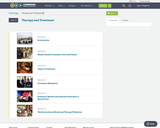
This resource is a video abstract of a research paper created by Research Square on behalf of its authors. It provides a synopsis that's easy to understand, and can be used to introduce the topics it covers to students, researchers, and the general public. The video's transcript is also provided in full, with a portion provided below for preview:
"A new algorithm has successfully mapped part of the brain’s circuitry during shock therapy. For those suffering from severe depression, the approach could make for safer and more effective treatment. For brain research at large, it could lead to better ways of untangling noisy neural data to reveal real connections between different focal regions of the brain. Despite the gruesome picture painted by pop culture, modern shock therapy is a mild treatment option. In fact, over 2 million treatments are administered worldwide every year. Under general anesthesia, patients receive a small amount of current to the brain, triggering a brief seizure. The resulting changes in brain chemistry have been shown to reverse symptoms of mental health conditions like severe depression or bipolar disorder. But the procedure isn’t perfect. One of the most troubling side effects is memory loss, a result of poor targeting. To be effective and safe, induced seizures should be restricted to the pre-frontal cortex..."
The rest of the transcript, along with a link to the research itself, is available on the resource itself.
- Subject:
- Anatomy/Physiology
- Applied Science
- Health, Medicine and Nursing
- Life Science
- Material Type:
- Diagram/Illustration
- Reading
- Provider:
- Research Square
- Provider Set:
- Video Bytes
- Date Added:
- 09/20/2019


